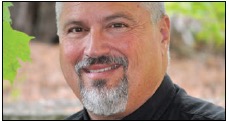The Journey of Discernment
Do not be afraid to ‘put out into the deep’
Deacon Steve Kramer Comments Off on The Journey of Discernment
 It was early January 1994 when I made my canonical retreat prior to ordination to the diaconate in May of that year. Three of us went to the Trappist monastery of St. Joseph Abbey in Spencer, Massachusetts. My memories of that time away from “the world” are still quite vivid.
It was early January 1994 when I made my canonical retreat prior to ordination to the diaconate in May of that year. Three of us went to the Trappist monastery of St. Joseph Abbey in Spencer, Massachusetts. My memories of that time away from “the world” are still quite vivid.
It was an intense period of discernment because I was struggling with how to balance my family (with four very young children), my career (challenging and quite demanding) and this love for the Church and Jesus Christ, which burned deep within my heart.
What does it mean to discern? Specifically, from a biblical perspective, the dictionary defines discernment as “a decision-making process in which an individual makes a discovery that can lead to future action.” Through the process of spiritual discernment, God guides a person to arrive at the best decision.
In the 2005 edition of the National Directory for the Formation, Ministry, and Life of Permanent Deacons in the United States there is a paragraph that speaks to the connection of discernment, conversion, and vocation: “The history … of every Christian vocation is the history of an inexpressible dialogue between God and human beings, between the love of God who calls and the freedom of individuals who respond lovingly to him” (No.165). It continues by noting that God calls us when we are marked through the sacraments of Christian initiation.
During the season of Lent, men and women who are catechumens are discerning their desire to enter the Church and receive the Sacraments of Baptism, Eucharist and Confirmation through the RCIA process. They are listening to the voice of the Lord. They are in the throes of an intense period of formation, and as they journey to the Rite of Election, they recognize how the Word of God and the community of faith they have been involved with are challenging them to continue in this new way of life. This is a major fork in the road with many questions. Do I continue? Do I trust this new relationship I have forged with Jesus Christ?
In his message for the 42nd World Day of Prayer in 2005, Pope St. John Paul II referenced Luke 5:4 — Duc in altum (“put out into the deep”). The pope said: “The command of Christ is particularly relevant in our time, when there is a widespread mentality which, in the face of difficulties, favors personal noncommitment. The first condition for ‘putting out into the deep’ is to cultivate a deep spirit of prayer nourished by a daily listening to the Word of God” (No. 2). It is even more relevant in 2022.
Any journey of discernment requires a commitment to listening to the Word of God in Scripture. The similarities of those engaged in the RCIA process, those who are discerning a vocation to the diaconate and deacons who have been ordained for many years are intertwined. Ultimately, all are called to a continuing conversion and discernment before the Lord.
In order to put out into the deep, there must be faith and trust in Jesus Christ. If I close my eyes, I recall one specific evening in Spencer, Massachusetts, being deep in prayer. The room was dark except for a candle burning softly next to the window, illuminating an icon of Christ. It had recently snowed (20 inches!) and as I opened the window it was incredibly quiet, still and bright. Night prayer was behind me and very distinctly I heard the Lord say: “Do not be afraid. I need you to be my servant.”
God had indeed brought me to the place where my discernment was confirmed. There was no longer any doubt whether to continue pursuing ordination. Only through fervent prayer and an openness to God’s Word can conversion and discernment come to fruition. This Lent, do not be afraid to put out into the deep. The world contains many twists and turns, but Christ will be right beside you.
DEACON STEVE KRAMER, D.Min., is director of homiletics and associate professor of pastoral studies at Sacred Heart Seminary and School of Theology in Hales Corners, Wisconsin.





